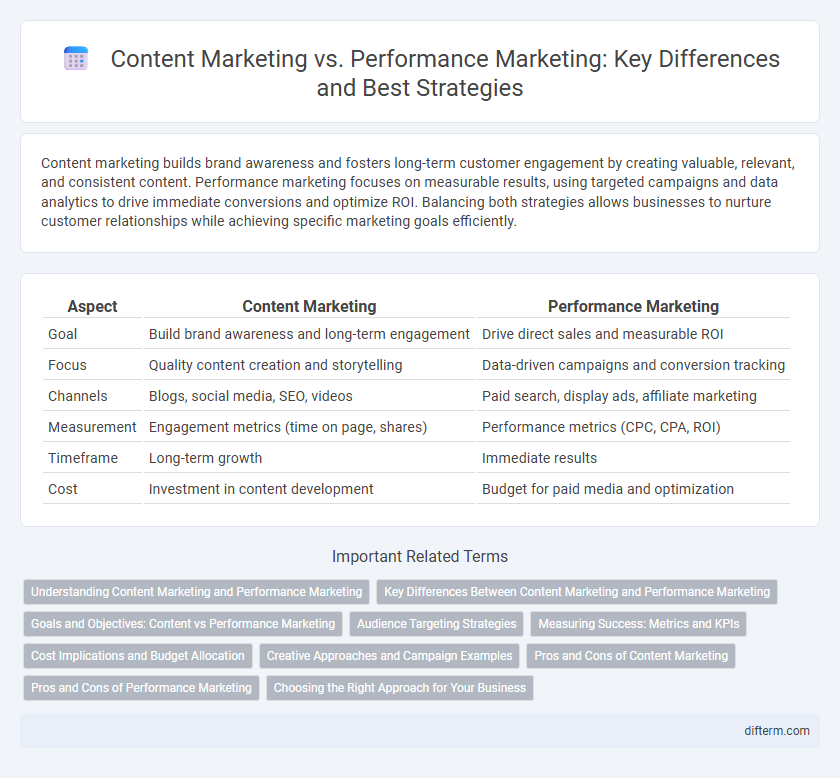Content marketing builds brand awareness and fosters long-term customer engagement by creating valuable, relevant, and consistent content. Performance marketing focuses on measurable results, using targeted campaigns and data analytics to drive immediate conversions and optimize ROI. Balancing both strategies allows businesses to nurture customer relationships while achieving specific marketing goals efficiently.
Table of Comparison
| Aspect | Content Marketing | Performance Marketing |
|---|---|---|
| Goal | Build brand awareness and long-term engagement | Drive direct sales and measurable ROI |
| Focus | Quality content creation and storytelling | Data-driven campaigns and conversion tracking |
| Channels | Blogs, social media, SEO, videos | Paid search, display ads, affiliate marketing |
| Measurement | Engagement metrics (time on page, shares) | Performance metrics (CPC, CPA, ROI) |
| Timeframe | Long-term growth | Immediate results |
| Cost | Investment in content development | Budget for paid media and optimization |
Understanding Content Marketing and Performance Marketing
Content marketing builds brand awareness and trust by creating valuable, relevant, and consistent content tailored to target audiences, enhancing organic engagement and long-term customer loyalty. Performance marketing emphasizes measurable, data-driven campaigns focused on direct response actions such as clicks, conversions, and sales, enabling precise ROI tracking across channels like PPC, affiliate, and social media ads. Understanding both strategies involves recognizing that content marketing nurtures relationships and brand equity, while performance marketing drives immediate, quantifiable results for optimized budget allocation.
Key Differences Between Content Marketing and Performance Marketing
Content marketing focuses on building brand awareness and long-term customer relationships through valuable, relevant content, while performance marketing targets immediate, measurable actions such as clicks, conversions, and sales. Content marketing relies heavily on SEO, storytelling, and audience engagement over time, whereas performance marketing emphasizes data-driven tactics like PPC, affiliate marketing, and retargeting campaigns to optimize ROI. The key differences lie in their objectives, measurement methods, and timelines, with content marketing investing in sustained growth and performance marketing aiming for quick, trackable results.
Goals and Objectives: Content vs Performance Marketing
Content marketing aims to build brand awareness, engage audiences, and establish long-term customer relationships by creating valuable, relevant content. Performance marketing focuses on measurable results such as conversions, sales, and return on ad spend (ROAS) through targeted campaigns and real-time optimization. Both strategies align with business goals but differ in prioritizing brand equity versus direct response metrics.
Audience Targeting Strategies
Content marketing leverages audience targeting by creating valuable, relevant content tailored to specific buyer personas, fostering long-term engagement and brand loyalty. Performance marketing employs data-driven targeting methods, utilizing precise demographics, behavior analytics, and real-time feedback to optimize ad spend and maximize immediate conversions. Integrating both strategies enhances reach by combining organic relationship-building with measurable, ROI-focused campaigns.
Measuring Success: Metrics and KPIs
Content marketing success relies on metrics such as engagement rate, time on page, social shares, and lead generation, emphasizing brand awareness and audience building. Performance marketing focuses on direct and measurable KPIs like click-through rate (CTR), cost per acquisition (CPA), conversion rate, and return on ad spend (ROAS) to evaluate campaign efficiency. Combining both strategies enhances overall marketing success by balancing long-term brand growth with immediate performance tracking.
Cost Implications and Budget Allocation
Content marketing demands a higher initial investment to create valuable, evergreen materials that build brand authority over time, while performance marketing involves direct spending on ads with measurable ROI and immediate results. Budget allocation often favors content marketing for long-term growth and audience engagement, whereas performance marketing budgets target specific campaigns aiming for quick conversions and cost-per-acquisition efficiency. Marketers must balance cost implications by analyzing lifetime value and customer acquisition costs to optimize spending between brand-building and performance-driven tactics.
Creative Approaches and Campaign Examples
Content marketing leverages storytelling and educational resources to build brand awareness and customer loyalty through blogs, videos, and social media posts, exemplified by Red Bull's immersive event coverage and GoPro's user-generated content campaigns. Performance marketing targets measurable actions using data-driven strategies such as pay-per-click ads, influencer partnerships, and retargeting, demonstrated by Amazon's precise ad placements and Airbnb's conversion-focused social media ads. Creative approaches in content marketing center on emotional engagement and long-term value, while performance marketing emphasizes real-time optimization and ROI tracking.
Pros and Cons of Content Marketing
Content marketing builds brand authority and fosters long-term customer relationships through valuable and relevant content but requires significant time and resource investment before seeing measurable returns. It enhances SEO rankings and organic reach, providing sustainable traffic growth, yet results can be unpredictable and difficult to attribute directly to sales. Unlike performance marketing, content marketing excels in nurturing trust and engagement but lacks immediate conversion tracking and rapid ROI measurement.
Pros and Cons of Performance Marketing
Performance marketing offers measurable ROI through data-driven campaigns, enabling precise targeting and real-time optimization. It requires substantial budget investment and may lead to short-term focus, limiting brand loyalty and long-term customer engagement. Balancing performance marketing with broader strategies ensures sustained growth and brand equity.
Choosing the Right Approach for Your Business
Content marketing builds brand authority and trust through valuable, consistent content that attracts and engages a target audience over time. Performance marketing drives measurable results and immediate ROI by focusing on data-driven campaigns, such as pay-per-click ads and affiliate marketing. Analyzing your business goals, budget, and customer journey helps determine whether long-term brand building or short-term conversions align best with your strategy.
Content marketing vs performance marketing Infographic

 difterm.com
difterm.com